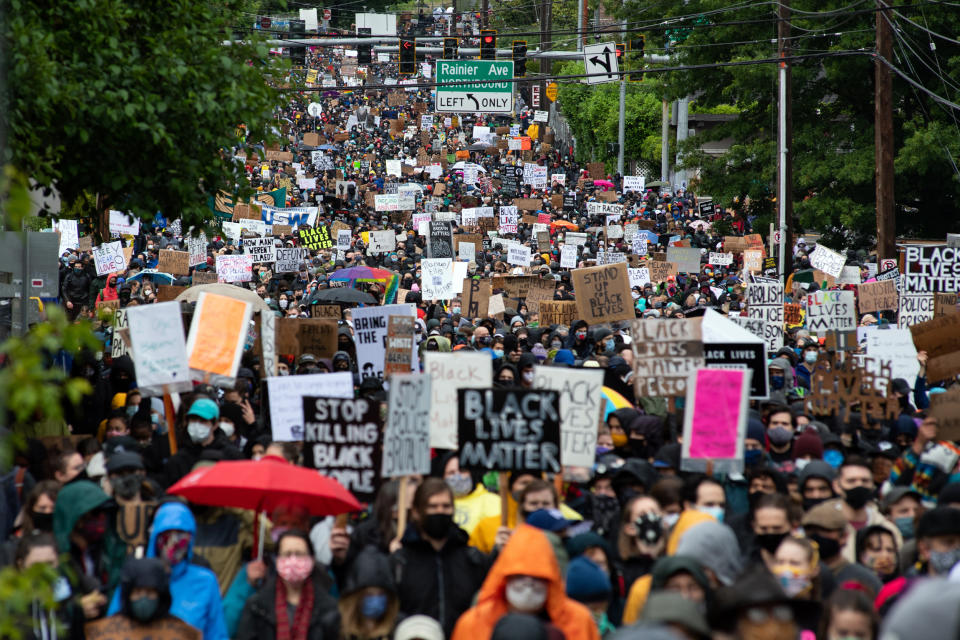Experts call 'anti-protest' bills a backlash to 2020's racial reckoning
- Oops!Something went wrong.Please try again later.
Republican legislators in several states have introduced at least 80 anti-protest bills restricting everything from “unreasonable noise” to wearing a mask during demonstrations in what some are calling a backlash to last year’s summer of protests.
The killing of George Floyd last May 25 sparked demonstrations across the country and amplified national attention to racism in police practices. Media outlets deemed it the “year of protests.” Now, there have been twice as many proposals to quell demonstrations in 2021's legislative sessions than in any other year, Elly Page, senior legal adviser at the International Center for Not-for-Profit Law, which tracks anti-protest legislation, told The New York Times.
“The reason so many protests exist in the first place, whether it’s the civil rights era or Black Lives Matter, is that they are trying to change things about our society and our political system that are fundamentally broken,” said Matthew Delmont, a history professor at Dartmouth College. “It’s important to understand that the anti-protest bills we’re seeing right now are an attempt to maintain the status quo and prevent more significant change that would lead to more equitable systems.”
A Republican-backed bill in Oklahoma grants immunity to drivers who hit protesters fleeing a demonstration. The American Civil Liberties Union of Oklahoma has condemned the bill, and Joshua Harris-Till, president of Young Democrats of America, called it “the worst anti-protest bill in the nation,” adding that it would affect marginalized communities the most.
Under a newly proposed bill in Minnesota, those convicted of a crime related to protesting could be barred from aid like student loans, housing assistance, unemployment benefits and more. And Indiana Republicans have introduced a law to make anyone convicted of rioting ineligible for state jobs and certain state and local benefits.
Legislators in several states, including New York, Washington, Wisconsin and others, have put forth bills to expand the definition of “riot” and place steep penalties on protesters.

Activists, organizers and advocates in Florida are reeling after Gov. Ron DeSantis signed into law HB1, which expands the definition of a “riot” and places strict penalties on demonstrators; denies bail to people arrested until after a court appearance; makes it a felony to destroy a flag or monument; and allows officials to appeal when municipalities cut police budgets.
DeSantis has called the law the "strongest anti-rioting, pro-law enforcement measure in the country,” echoing other Republicans who say they support such bills as targeting rioters, as opposed to peaceful protesters.
Critics of the Florida bill have called it excessive and vague, lamenting that protesters will be unclear about what they can and cannot do. DeSantis signed the bill as Derek Chauvin stood trial in Minnesota for Floyd's murder.
Melba Pearson, a civil rights attorney and former candidate for Miami-Dade state attorney, called HB1 “a solution looking for a problem.”
“What the bill does is, it creates a new class of minimum mandatories and enhances charges for organizers of the protests. So we’re going beyond people who have done something illegal,” Pearson said. “The fact that people would now be afraid to go out and protest … is another way of attacking your First Amendment right. This means people are going to be less likely to exercise that right due to fear of excessive government action.”
A recent report found that law enforcement groups, like police unions, donated hundreds of thousands of dollars to legislators who went on to propose anti-protest laws. Delmont said the onslaught of anti-protest bills are likely part of a larger effort to “restrict who can participate in democracy” that includes recent laws to restrict voting rights.
Related: Critics say the effort stems from the pushback to last summer's Black Lives Matter demonstrations.
Strict legislation in response to social justice movements is common though, he said. He said the most prominent historical example is the rarely invoked Anti-Riot Act — passed as a rider to the Civil Rights Act of 1968 — which penalizes those who travel to organize, incite or promote a “riot.” The act was accompanied by stricter police practices implemented in the decades after, Delmont added.
“It has been a pretty consistent pattern, at least since the 1960s, that any kind of movement for racial justice is accompanied by a strong desire by a different set of the population to rein those protests in and re-establish a sense of order — typically for white Americans,” Delmont said.
The trend has persisted in recent years. In 2017, Republicans in more than a dozen states proposed laws to impose strict penalties on protesters and control demonstrations. Since 2016, at least 13 states have enacted laws to increase penalties for interfering with infrastructure sites like pipelines and oil refineries. These laws, some say, work to threaten Indigenous communities and climate movements.
“The way authorities have limited protest activity is by trying to demoralize different social movements,” Delmont added. “The over-policing that comes along with law-and-order politics just makes it difficult to build and maintain grassroots social movements that would have regular public protests. The bills we’re seeing today are as much about signaling to different constituents as they are about trying to stop the kinds of massive protest we saw last summer."

